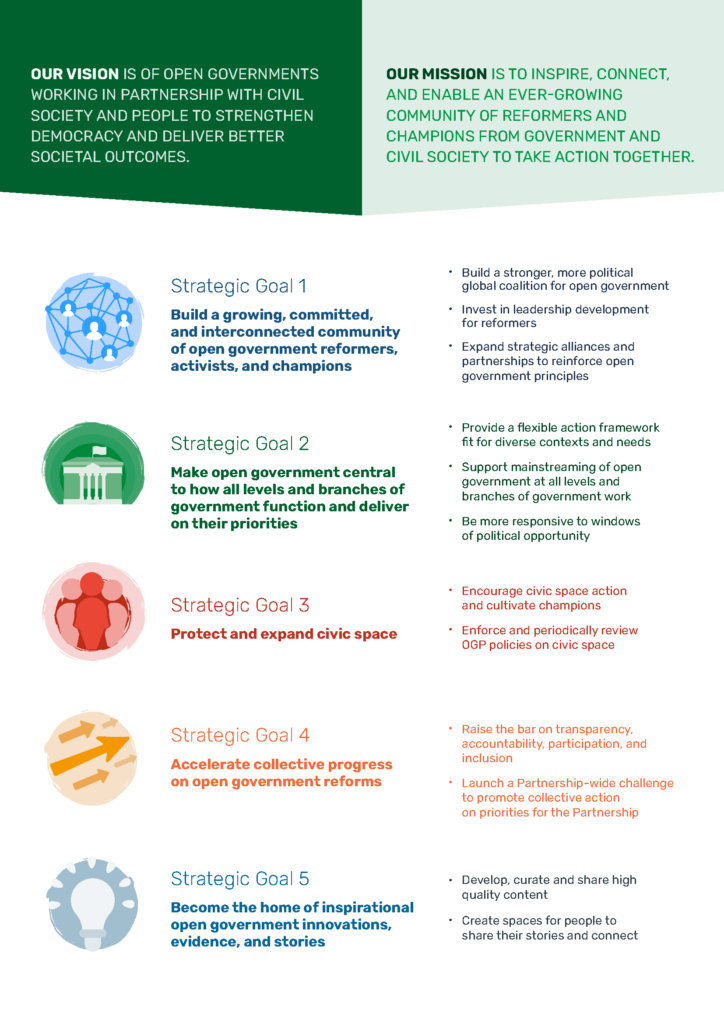Background and Context
The Open Government Partnership (OGP) was formed in 2011 by governments and civil society organizations seeking new ways of working together to address difficult challenges. The founding idea was that more collaboration between governments, civil society, and citizens, better sharing of innovations globally, and a focus on implementing specific and measurable open government actions would create a race to the top and help governments work for all, not just the most powerful.
OGP has grown over its first decade into a global effort of close to 200 national and local governments, thousands of civil society organizations, and many others. The last ten years have shown that the core model works: when civil society is involved in designing and implementing OGP action plans, commitments are more ambitious, are better implemented, produce more changes in government practices, and result in better outcomes for people. OGP’s Independent Reporting Mechanism (IRM) has found that nearly 500 OGP commitments have significantly opened up governments.
As the OGP community has been growing and important results have been achieved, the world has experienced a prolonged period of democratic backsliding while dealing with systemic challenges like climate change, conflict, inequality, and a global pandemic. Authoritarian and populist leaders have attempted to restrict space for civil society, spread disinformation online, and attack human rights. Corruption often underpins these efforts to undermine democratic freedoms and exacerbates the challenges societies face. While the OGP community has been innovating and learning together on making governments more open, responsive, and accountable, a parallel effort has been taking place to entrench power and close governments.
OGP represents the hopeful alternative. The OGP community is made up of thousands of relentless, creative, and inspiring trailblazers, innovators, and deeply committed reformers striving to make a difference. Countries are embracing sweeping anti-corruption measures, such as beneficial ownership transparency and open contracting. Innovative methods of public participation have moved from the fringes of policy-making around the world to becoming more common, even being embraced by many skeptics.
The world has also seen mobilizations in defense of democracy on a scale unmatched in recent history. Populists and authoritarians have been unable to hold on to power at a higher rate than any other group, and elections continue to be as competitive as at any time in history. Countries like Ukraine have proved that democracies can be resilient, even in the face of extreme external and internal threats.
The opportunity of this Strategy is to ensure that OGP can translate this positive energy into lasting policy change and tackle current and future challenges. The Strategy has been developed through the most comprehensive community engagement process in the Partnership’s history, involving thousands of people from across the world. The result is a renewed vision for OGP as a more political, values-based partnership rooted in specific actions, innovations, and ideas for more open and democratic governments that meet citizens’ expectations.
Vision and Mission
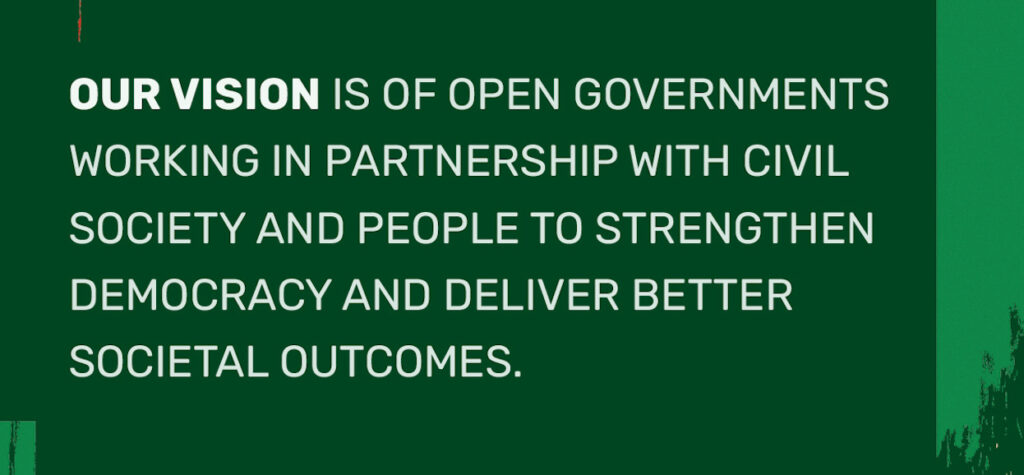
Open government as an approach means:
- Everyone can access relevant, usable, and timely information about government processes and decisions that impact their lives.
- Everyone has an equal opportunity to participate freely in shaping the public policies and decisions that impact their lives.
- Everyone has the freedom and ability to seek effective redress when the rule of law is not upheld, their rights are not respected, or their needs are unmet, without risk or harm. Public officials are accountable for their decisions and actions.
- Public resources are managed transparently, fairly, and equitably.
- Governments collaborate with civil society, academia, private sector and others to find and implement innovative and sustainable solutions to societal challenges.
- Transparency, accountability, participation, and inclusion are embedded in the culture and practice of governments at all levels.
For much of OGP’s first decade, the primary path to implementing OGP’s vision was through co-creation of reform commitments in national and local action plans. OGP’s approach focused on maintaining high-level political leadership and commitment, fostering peer exchange among reformers and supporting them with technical expertise and evidence, and ensuring that members were held accountable through the IRM. The OGP community has been able to achieve great success through this approach, but there is potential to achieve much more together.
This Strategy builds on this track record and recognizes that significant and enduring changes will need to come from a growing number of reformers—political leaders, civil society, social movements, business leaders, journalists, public servants—who innovate and embed open government in their daily work. This demands a shift of approach in which OGP as a community focuses on cultivating a much stronger movement of such reformers and leaders who drive change and take action, both through and beyond OGP, to support them in their efforts to put people at the heart of their governments.
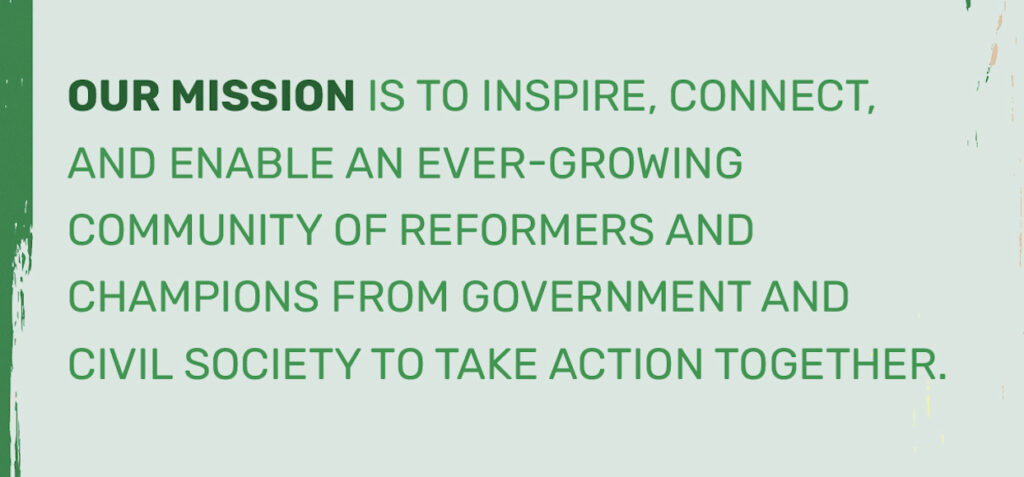
Process to Develop the Strategy
The Strategy is a result of a year-long consultation process that involved three stages focused on identifying a) the relevance, the contribution, and the most impactful role OGP can play; b) specific models, strategies, and priorities for getting to greater impact; and c) ways to operationalize the Strategy.
Well over a 1000 contributions were received from individuals, organizations, coalitions, OGP members and multistakeholder fora through a variety of channels—online consultation platforms, virtual and in-person meetings, and OGP regional events—and in the form of feedback on drafts throughout the process. The OGP Steering Committee and Support Unit’s objective was to ensure that the process met the OGP Participation and Co-Creation Standards.
Findings from the first phase of the consultation, which focused on relevance, contribution, and impact, led to the development of some potential emerging strategic directions. These directions were put to further consultation in a second phase for validation and to solicit specific ideas on how to pursue them. These inputs shaped the draft Strategy, which was opened for public comments for a two-month period. Feedback received across these stages is reflected in this final Strategy.
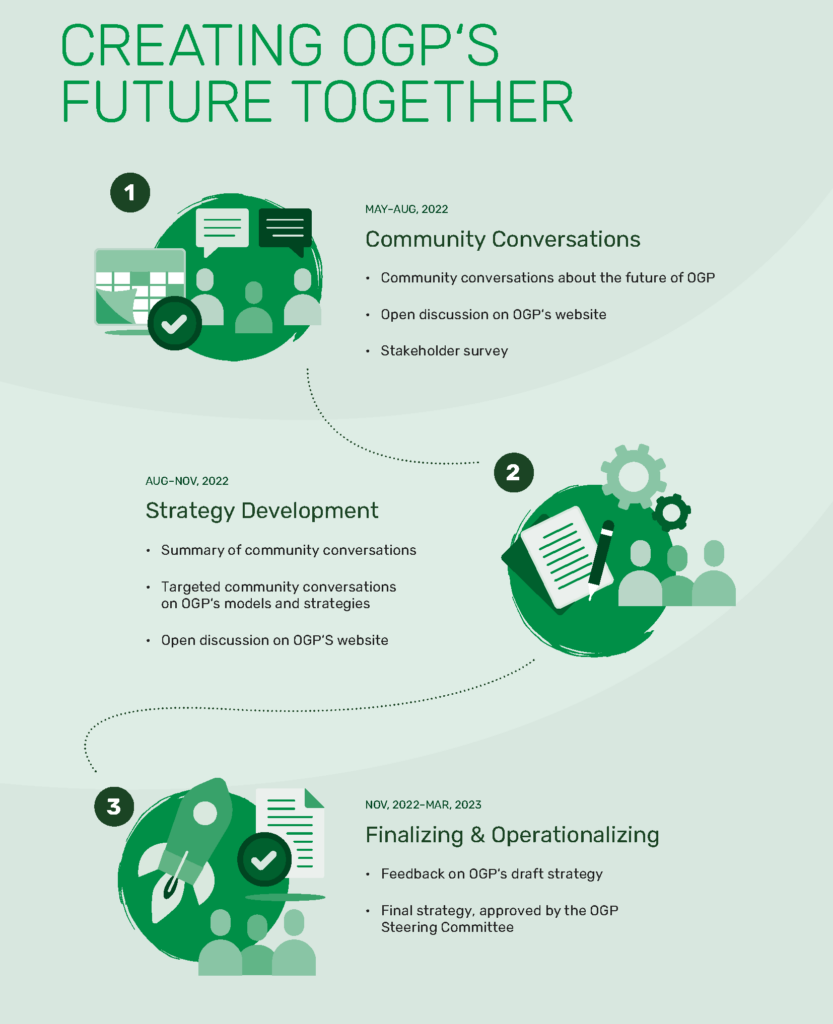
More information on the design and scope of the process, on how feedback has shaped the final Strategy, and on lessons learned through this process can be found in the reasoned response reports published at the end of each phase.
Strategy: Goals and Theory of Change
Since 2011, OGP has focused on advancing its founding values and principles to make governments more transparent, accountable, participatory, and inclusive. In its 2023–2028 Strategy, OGP will build on those values and principles by pursuing five mutually reinforcing goals:
- Build a growing, committed, and interconnected community of open government reformers, activists, and champions.
- Make open government central to how all levels and branches of government function and deliver on their priorities.
- Protect and expand civic space.
- Accelerate collective progress on open government reforms.
- Become the home of inspirational open government innovations, evidence, and stories.
These goals are designed to be pursued in an integrated way, with roles for everyone in the OGP community and with implementation strategies adapted according to the context. For example, in contexts where there is strong political and bureaucratic support for open government or a window of opportunity to pursue reforms, the approach will be to enhance the capacity and skills of reformers in government and civil society to translate political pledges and commitments into action and embed open government approaches for the long term. In contexts of waning or limited political will or declining civic space, the approach will be to enhance the capacity and skills of reformers to find compelling value propositions and different entry points to continue to make progress, protect space for dialogue, and prevent rollbacks of reforms.
OGP’s foundational design principles will continue to underpin its strategic goals, with some evolution in how these principles are applied.
OGP’S Design Principles Action oriented: OGP is a platform for action, where all members make and implement concrete open government commitments, which are then monitored by the IRM and other monitoring bodies. Flexible but ambitious: Members have different starting points, but all commit to stretching beyond current practice and striving for continuous improvement. Genuine partnership: OGP is a shared and co-led endeavor of government and civil society working together to deliver better outcomes, so that civil society and citizens can shape and help implement reforms and hold governments accountable for progress. Country ownership: As a global initiative, OGP aims to strengthen, not distort, the accountability of governments toward citizens. Innovation and exchange: No country or region has a monopoly on best practices in open government; everyone has something to share and something to learn. Inclusion: OGP aims to promote inclusion of those traditionally underrepresented due to gender, race, ethnicity, geography, or socioeconomic status in OGP structures and governance at the global, national, and local levels. OGP seeks to encourage all members to make concrete commitments to advance and mainstream inclusion in their OGP process and commitments. |
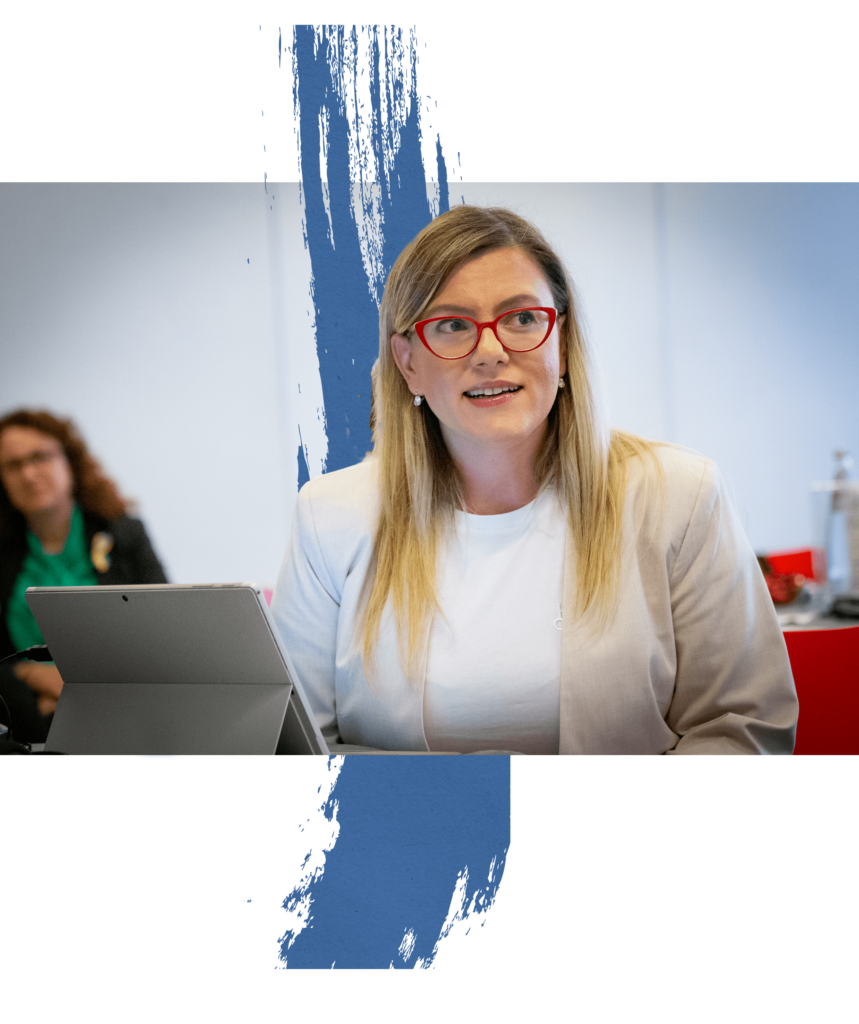
The theory of change that underpins this Strategy recognizes several important conditions for sustained change in open government that delivers for people. These are based on OGP’s own data and evaluation as well as the wider body of evidence about how change happens in the open government field and beyond. The strategic goals and ways to pursue them are intended to influence these conditions.
- Public support: Strong public support for reforms—articulated through elections, public campaigns, and social movements—creates the context and demand for political leadership and bureaucratic action, making transformational reform more likely and sustainable.
- Civic space: The existence of laws, practices, and cultures that encourage and protect the ability of people and organizations to meaningfully participate in public life and debate is a significant precondition for citizens, civil society, and other groups to be able to effectively champion and help deliver ambitious open government reform.
- Political and multilevel leadership: The prospects for open government reform are highly shaped by political leadership. Combined with the actions of social movements, civil society, and government officials, political leaders play different but interdependent roles in shifting agendas, creating political possibilities, and implementing and sustaining change. Leaders in all parts of society who are committed to open government have to sustain their commitment and grow their capability to produce change over time.
- Multi-stakeholder collaboration: Co-creation is at the heart of open government and produces more ambitious and effective reform. People working together—including in loose coalitions—can, over time, produce significant and sustained change in government policy, practice, and culture as well as in terms of who can participate in, influence, and monitor those changes. Expanding who is meaningfully included and has influence is a key driver of change in open government.
- International support and exchange: External actors do not lead national or local change but can play an important role in supporting domestic efforts and contributing to the broader conditions that make open government more attractive and feasible. Being part of international platforms, standards, and events helps create and sustain commitment to open government. Being connected to leaders and reformers in other contexts and having access to ongoing learning and inspiration from elsewhere can help support and sustain national and local leaders in this work.
Strategic Goal 1
Build a growing, committed, and interconnected community of open government reformers, activists, and champions
OGP’s greatest strength is the community of open government reformers, activists, and champions who make up the Partnership. Since its founding in 2011 by a small group of government and civil society leaders, the OGP community has become much larger and more diverse.
Today, in some of the most active member countries, a core group of government and civil society reformers has been joined by local and subnational leaders, parliamentarians, youth organizations, groups working on gender equity, academics, and, in a smaller number of cases, private-sector representatives, judiciaries, and the media. OGP’s vision will be realized only if this vibrancy is replicated in more national and local contexts and adds up to a bigger and stronger global movement of open government leaders and coalitions that drive change in their contexts and learn from each other.
These open government leaders need to be supported so they have the skills, networks, resources, tools, and mindset to continue expanding the community and implementing ambitious reforms. They also need to be connected with each other as part of national, thematic, and global networks that help strengthen their work and enable rapid learning.
Globally, OGP has built a strong set of partnerships with international organizations, platforms, and networks where open government topics are on the agenda. Those existing partnerships now need to be strengthened and new ones formed to help advance areas of this Strategy.
How the OGP community can achieve this goal
Governments and civil society leaders across the Partnership have an important role to help broaden and strengthen the open government community in their contexts and globally. At the national and local levels, this includes core open government leaders and members of multi-stakeholder fora who engage with other potential allies, as well as ministers, senior leaders and practitioners in agencies or line ministries, champions in other branches of government, and broader civil society. Globally, ministers and civil society members of the OGP Steering Committee will need to invest more political capital and time in reaching out to their peers to build more support for open government.

The OGP Support Unit will dedicate resources to designing global and regional events to strengthen the community, better equipping open government leaders with the tools they need to succeed, and making connections among different parts of the community.
A strength of the OGP community is the presence of different sectors with common interests, for example groups working on open data, access to information, and procurement reform. OGP spaces, such as events and peer exchanges, will continue to be designed to maximize opportunities for dialogue that leads to more integrated policy-making.
Priorities under this goal for the 2023–2028 strategy period
- Build a stronger, more political global coalition for open government
Political leadership is essential for shaping and sustaining ambitious open government reforms. This includes heads of state and government, ministers, local leaders, and senior civil servants providing leadership within governments and working in collaboration with external sources of political power, such as civil society coalitions.
Political engagement in the Partnership has decreased at the ministerial and head-of-government levels from the very high rates of participation in the early years. This trend has coincided with a decade of democratic backsliding globally, in which political leadership for democracy and open government has been sorely missing in many countries.
Over the next five years, a Partnership-wide effort is needed to invest in mobilizing a much broader spectrum of political support for open government and OGP, including from mayors, members of parliament, ministers, and heads of state and government. This will help build a pipeline of future champions and ensure that open government reforms are less vulnerable to being deprioritized when leaders change.
There are several existing approaches to tackling this challenge that should be expanded, and some new approaches that should be tested.
First, open government advocates need to connect better with politically relevant agendas and priorities and create the political incentives for action. This means being armed with evidence, inspiring stories, and peer comparisons to appeal to political leaders with different backgrounds and priorities. The Ministerial OGP Steering Committee and the Support Unit also need to better identify, support, and spotlight a broader cadre of new political champions, including future elected and civil service leaders.
Second, OGP regional events and global summits will be designed more intentionally with the community to bring in more political actors and politically relevant discussions and secure concrete commitments from leaders. This will involve making these events more attractive for high level participation, and participation of those that are not part of the current membership.
Third, OGP national members should strengthen their engagement with foreign ministries to ensure linkages with other international priorities and pledges and, with that, continuity of support across administrations.
Fourth, members of the Steering Committee, as the Partnership’s representative political leadership body, need to lead by example in their domestic OGP processes and internationally in outreach to their peers to secure buy-in and support for OGP and the Strategy.
Fifth, OGP’s network of ambassadors and envoys will be more proactively engaged to open political doors and make connections in windows of political opportunity.
Sixth, OGP will do more to support and incentivize open government progress in non-member countries. The priority will be to encourage self-service use of the OGP model, with specific support to near-eligible countries to join in the near future. The Steering Committee will also decide on specific options for participation for countries that are not universally recognized. At the local level, membership options for local jurisdictions from non-member countries will be developed.
Finally, there needs to be strong public demand for open government that creates incentives for political leaders and public officials to adopt and advance reforms. OGP will be a space for learning from countries where this support exists and for sharing lessons learned so that governments and civil society have relevant tools to better engage the wider public. In certain contexts, this will include working with social movements and the media.
- Invest in leadership development for reformers
Individual reformers in government and civil society who can lead and sustain open government reforms, even in difficult contexts, are a vital part of the OGP community. OGP has been a platform for peer exchange and learning to share knowledge and access technical assistance. In the future, the focus will also be on developing the leadership skills of current and future community leaders. Such leaders span senior bureaucrats, civil society leaders, junior ministers, emerging political leaders, parliamentarians, and critical reformers in other sectors at the national and subnational levels; each group has the potential to inspire others or move open government reforms forward.
The focus will be on enhancing reformers’ leadership and adaptive capabilities to navigate complex change, secure the political and public support to help spread open government reforms, and acquire fundamental open government skills. These skills include embedding inclusive public participation in government practices, policies, and services; connecting to people’s movements; fostering meaningful and proactive transparency; and expanding civic space.
This priority will be advanced in two specific ways.
First, OGP members and the Support Unit will work more closely with schools of government, public policy, and politics as well as other learning partners that have expertise and relevant audiences. Several countries, including Estonia, Kenya, Nigeria, and Spain, already provide open government training to civil servants and can share their learning. Networks such as the Regional School for Public Administration in the Western Balkans and the UN Economic Commission for Latin America and the Caribbean (ECLAC-CEPAL) in the Americas have also pioneered this work at a regional level.
The objectives are to expose more relevant actors to open government thinking and approaches and to create networks of alumni who have participated in open government courses and bring those skills into their domain of work. The ultimate aim is to diffuse open government skills across government and beyond. The OGP Support Unit will work with these institutions to develop an open government 101 training and other public learning assets that everyone across the Partnership can use. This will be part of the effort to make OGP the home of inspirational and evidence-based open government content and learning.
Second, building on the successful pilot phase of the Open Government Leadership Collaborative, the OGP Support Unit will expand and diversify its leadership programs by selecting regional and thematic cohorts of reformers who can drive change in their contexts and creating a network of alumni who support one another. Over time, OGP will explore partnerships with leadership institutes in delivering such programs and introducing a certification scheme for quality control and recognition.
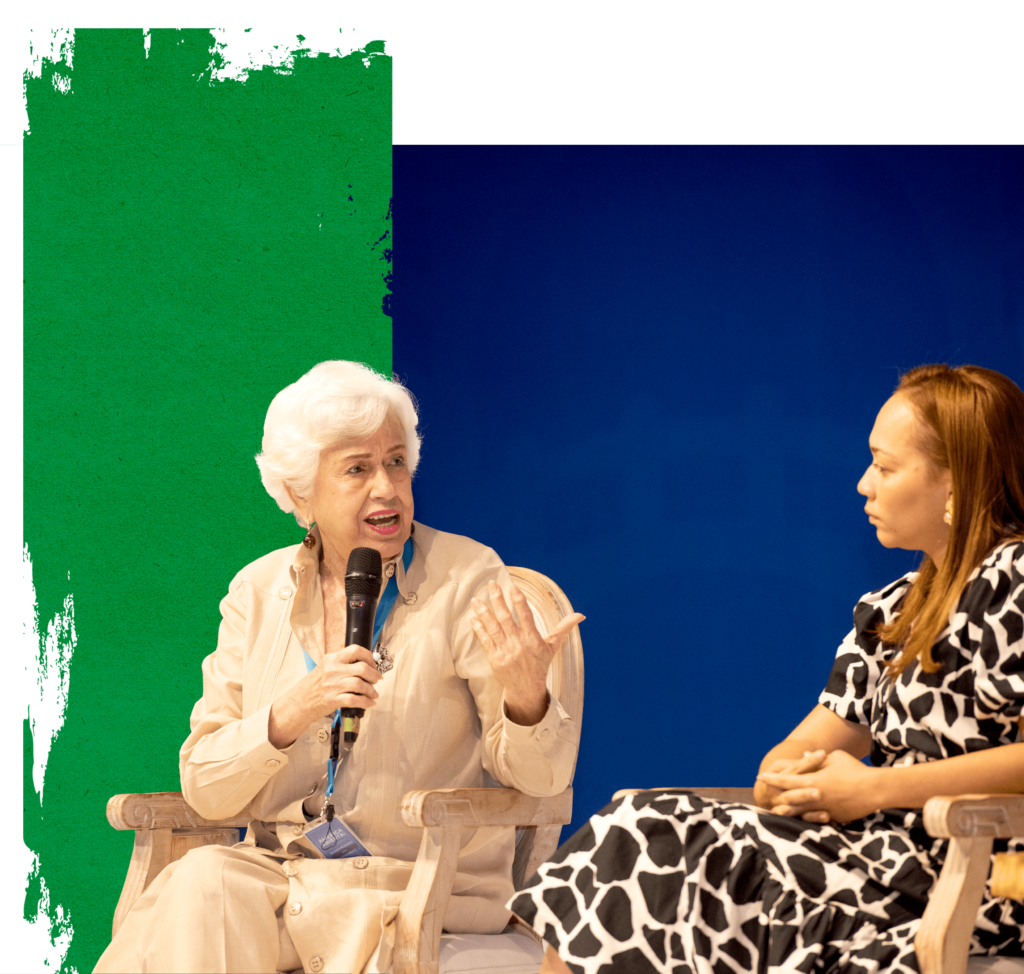
- Expand strategic alliances and partnerships to reinforce open government principles
A broad set of global and regional alliances and partnerships is necessary for OGP to reach new audiences and create advocacy opportunities for the community. For example, multilateral organizations and international networks with aligned missions can amplify and anchor open government principles through their own strategies and activities. This has helped broaden the open government field through initiatives such as the Organization for Economic Cooperation and Development (OECD) Recommendation of the Council on Open Government and influence international agendas such as the Sustainable Development Goals. OGP has established itself as a partnership that can be the connective tissue between global platforms and agreements, on the one hand, and domestic implementation, on the other, with accountability via the IRM.
In the future, the Partnership will take a more intentional and strategic approach in leveraging alliances, platforms, and partnerships that can strengthen the open government movement, advance thematic priorities, and spread open government approaches. National and local OGP processes can be used by the OGP community to ensure that global commitments are integrated from fora such as the Summit for Democracy, the UN Convention Against Corruption, the International Anti-Corruption Conference, and regional bodies.
There will also be greater emphasis on ensuring that in big moments, the Partnership leverages its collective power and voice, using the strength and access of the OGP Steering Committee, ambassadors, and envoys. OGP will also play a more proactive convening and agenda-setting role on emerging public policy challenges, based on Partnership-wide priorities. This will build on previous efforts, such as the Beneficial Ownership Leadership Group and the Open Response + Open Recovery campaign on the COVID-19 pandemic.
The OGP Steering Committee and Support Unit will also invest in creating stronger partnerships with organizations and institutions—old and new—that can support reformers driving change. This includes international organizations such as the European Union, ECLAC-CEPAL, and technical implementation partners at the global, regional, and national levels.
Strategic Goal 2
Make open government central to how all levels and branches of government function and deliver on their priorities
OGP’s action framework is built on concrete actions, co-creation with civil society, and accountability. This requires governments to work together with civil society to commit to and implement concrete open government reforms and be held accountable through the IRM, domestic stakeholders, and other monitoring efforts. This framework is central to ensuring that open government goes beyond rhetoric to action. The last ten years have shown us that the core OGP model of co-creation between governments and civil society, when done well, produces ambitious commitments and strong results.
OGP’s action framework now needs to be strengthened to enable and incentivize ambitious reforms that are implemented and institutionalized over time. The framework needs to be fit for purpose for different contexts and needs while maintaining common expectations from all members on adhering to core OGP design principles of co-creation, implementation, monitoring and accountability, and inclusive multi-stakeholder collaboration.
Today in some OGP member countries and participating local jurisdictions, efforts are underway to develop longer-term open government strategies, embed open government principles in national development plans or sectoral priority programs, and expand the open government agenda and OGP activities to include local governments, parliaments, judiciaries, and oversight institutions. OGP’s vision will be realized only if such efforts are deepened, institutionalized, and replicated in more places.
In parallel to efforts to make open government integral to how governments work, the open government community needs to better prepare for and respond to major developments that could alter the course of open government globally, nationally, or locally. These developments could relate to moments of crisis, such as major corruption scandals, or defining political or social moments, for example major political transitions, protests, or global agenda-setting moments.

How the OGP community can achieve this goal
Governments and civil society organizations at the national and local levels have a role in ensuring that the OGP platform and action framework are used to implement longer-term strategic reform agendas. OGP national and local stakeholders and/or multi-stakeholder fora have a part to play in assessing and pursuing opportunities for institutionalizing open government in their contexts, better connecting open government work that takes place within and beyond the OGP framework, engaging the right champions, and ensuring open government is embedded across key national and sectoral strategies and programs.
Governments, civil society, and multi-stakeholder fora will also have a role in building cross-party support for the open government agenda. They will need to build coalitions to effectively respond to major windows of opportunity and help identify how global actors can best support them in these moments. The Support Unit will enable peer exchange and learning among members and work toward curating the collective resources, tools, and knowledge that can be applied by others facing similar needs in the future.
The OGP Support Unit, under the guidance of the Steering Committee, will create the supporting infrastructure for the action framework: rules, guidance, services, and peer learning opportunities. The Support Unit will also invest time and resources in a subset of countries where conditions are conducive to show proof of concept for an integrated approach to mainstreaming open government across all branches and levels of government and better responding to windows of opportunity.
Priorities under this goal for the 2023–2028 strategy period
- Provide a flexible action framework fit for diverse contexts and needs
The OGP Support Unit, under the guidance of the Steering Committee, will build on feedback from the community to develop a flexible action framework that members can use to advance open government in ways that are best suited to their contexts. For some, this might mean developing open government strategies; for others, it might mean focusing on a few themes or sectors at a time owing to opportunities or limited political support or administrative capacity; and for many, it might mean continuing with the current model of OGP action plans.
At its core, this framework will emphasize adherence to OGP principles—co-creation, action and implementation, monitoring and accountability, and learning—regardless of specific ways in which members choose to advance open government action. The focus will also be on consolidating the different action models that currently apply to OGP Local, national OGP members, and OGP parliamentary action plans into a core framework, with add-on features suitable to different branches of government. This new framework will be accompanied by updated rules, guidance, and services.
- Support mainstreaming of open government at all levels and branches of government work
Nascent efforts are underway in several national and local contexts to mainstream open government. However, in the vast majority of members, more foundational work is needed to increase awareness of open government and engage different branches and levels of government in open government efforts.
Several existing approaches to pursuing this work will be expanded, and some new approaches will be tested. These efforts will not constitute additional formal requirements on OGP members or mean bringing all open government work that takes place in a national or local context under the OGP brand.
First, this priority will need an integrated approach to engaging different branches and levels of government on the open government agenda. It will mean focusing on the complementary roles that national and local governments, parliaments, judiciaries, and oversight institutions can play in advancing specific policy areas or developing comprehensive open government strategies, rather than pursuing disconnected agendas through stand-alone processes. This is consistent with the role of parliaments in advancing open government as laid out in the 2021 policy on parliamentary engagement in OGP and the emphasis on national-local integration in the 2020 OGP Local strategy.
The OGP Support Unit and partners will prioritize investment in a handful of countries that are ready to take open government to the next level. In turn, these leaders have a role to inspire and support others to follow suit. Where governments cannot initiate such an integrated approach, civil society will have a critical role in connecting agendas, supported by global and regional partners and outreach from the OGP Steering Committee and Support Unit.
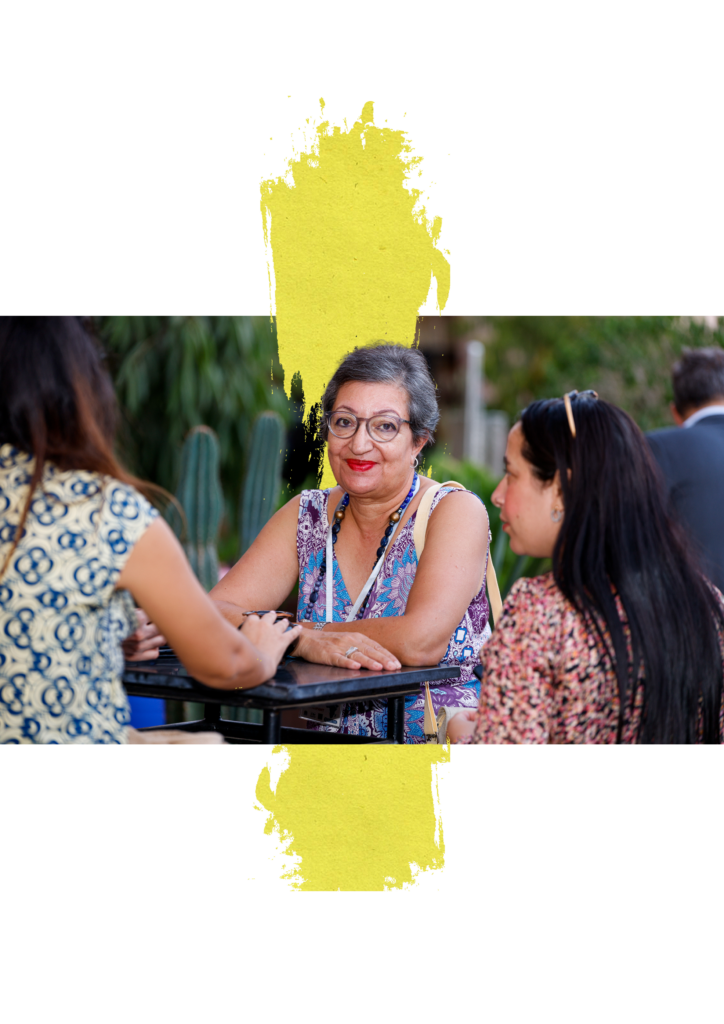
Local and regional associations or autonomous institutions that work with subnational governments can be advocates and custodians for OGP-like co-creation processes and action plans, adopted at scale and adapted to local needs. Additionally, the OGP Local track will be grown sustainably to serve as a cohort of champions and innovators who are leading on ambitious open government reforms and inspiring action in other places.
Achieving all of the above will require ensuring that reformers at the local level and in parliaments and judiciaries are included in efforts to build a stronger open government coalition and build leadership skills and capabilities, as outlined in strategic goal 1. Similarly, they will need to be a part of efforts to drive collective progress on key open government topics and to build collective assets of data, evidence, and stories, as outlined in strategic goals 4 and 5.
Second, this priority will mean institutionalizing open government reforms and OGP to ensure continuity of reform agendas through political transitions. This will require national and local actors to build cross-party support for the agenda by fostering public support and working with champions within political parties. It will also mean developing recommendations for members to institutionalize OGP through administrative, regulatory, or legal instruments to ensure continuity of open government and OGP commitments across political cycles. The Steering Committee will play a more political and outward-facing leadership role in engaging high-level government peers, communicating the value proposition for open government and OGP, and securing the commitment of newly formed governments.
Third, this priority will mean embedding open government approaches in major reforms that tackle key societal challenges, including national or local development plans and sectoral policies and programs. Efforts to do so are already underway in several OGP members. This entails a) strengthening co-creation, multi-stakeholder collaboration, and accountability in the processes undertaken for developing and implementing such policies and practices; b) better connecting open government efforts undertaken through OGP action plans and those that take place outside the action plan; and c) investing in the skills and capabilities of public officials as outlined in goal 1 above and improving processes to enable open government to become more embedded in the culture and practices of governments.
- Be more responsive to windows of political opportunity
All parts of OGP can be more strategic and agile in more quickly identifying and preparing for key moments of opportunity or crisis that could significantly alter the course of open government at the national or local level. This includes preparing both for potential new governments coming to power that want to champion improving transparency, accountability, participation, and inclusion and for those that might mean a severe rollback of open government initiatives and an undermining of civic space.
The OGP Support Unit will collaborate with thematic, bilateral, and multilateral partners and work with national and local actors in swiftly engaging as such windows emerge at the country or local level. Elements of this Partnership-wide approach will include a combination of rapid-response approaches, recognition and incentives, the application of OGP’s Rapid Response Protocol and Response Policy, political outreach, work with social movements, and dedicated peer support from the Steering Committee, donors, and others.
Strategic Goal 3
Protect and expand civic space
Since OGP’s inception, many countries have improved on different open government dimensions, but civic space has significantly declined. This decline threatens the very premise on which the OGP model is anchored: an equal partnership between government and civil society. The sustainability and implementation of reforms is possible only if democratic rights are safeguarded and there is free and open space for civil society.
In recent years, protecting and expanding civic space has become a Partnership-wide priority, including through commitments in action plans, the Democratic Freedom Learning Network and other peer learning spaces, regional and global events, the Steering Committee co-chair agendas, and OGP’s policies to call out regressions, for instance the OGP Values Check and Response Policy. Despite this, progress to date has been too limited, but there is significant room for the Partnership to mobilize more political leadership for civic space and advance reforms on this agenda over the next five years.
How the OGP community can achieve this goal
All members endorse the principles enshrined in the Universal Declaration of Human Rights, the UN Convention against Corruption, and other applicable international instruments related to human rights and good governance on joining OGP through the Open Government Declaration. The ambition of this Strategy is to incentivize and support action on these values. National and local political leaders involved in OGP can make civic space a priority and champion civil society in their interactions with other parts of their governments and with their international peers.
Senior civil servants can build opportunities for dialogue and collaboration with civil society and address civic space issues where they intersect with their policy areas, for example by engaging with environmental defenders. Finally, civil society organizations can make sure that proposals for civic space reforms are prioritized in discussions with governments and that groups focused on democracy and human rights are included in open government fora.
Priorities under this goal for the 2023–2028 strategy period
- Encourage civic space action and cultivate champions
Civic space will need to be a much more prominent shared priority for all actors in OGP. In practice, that means expanding on some existing approaches and testing some new ones.
First, this means a continuing emphasis on all members to take action on civic space. Enabling progress in this area will require leaders across the Partnership, especially political leaders, to proactively speak up for the need to protect and expand space for civil society and democratic dialogue. This will include setting the political tone at high-level events, addressing civic space in bilateral discussions, and advocating for civil society in countries where there is backsliding. With partners, the Support Unit will work toward creating a coalition of political leaders who take bold action on civic space at home and actively champion the issue abroad with peers.

Second, where windows of opportunity emerge to secure substantive civic space reforms, the OGP community will need to provide support to ensure that these opportunities are not missed. The analysis done by many OGP partners, including the International Center for Not-for-Profit Law, CIVICUS, and the OECD, provides strong recommendations—highlighted by OGP’s IRM in its assessments—for the types of reforms that are needed. OGP can be used as the implementation platform to act on these recommendations.
Third, the Support Unit, in collaboration with other partners, will connect civic space to discussions about other issues and priorities, such as justice, anti-corruption, and climate action, as well as focusing on positive narratives about the vital role that a thriving civil society plays in addressing key policy challenges and responding to crises.
Fourth, the Steering Committee and the Support Unit will better identify and mobilize champions across sectors, especially governments, and highlight innovative approaches of government and civil society working together. Civic space will be embedded as a key priority across activities to build open government leadership and train public servants. Inspiring civic space reformers and reforms will be championed through events, awards programs, and campaigns.
OGP Points of Contact, along with other civil servants who partner with civil society to implement reforms, will be encouraged to share their valuable experience of enabling dialogue and collaboration with civil society within their governments.
Fifth, champions of civic space in OGP will need to be better supported with guidance, learning opportunities, and resources. The OGP Support Unit will enable this via the Democratic Freedoms Learning Network, broker advice and support from international experts, connect civil society organizations with sources of advice and support where civic space is in decline, and link donors and funding to reformers and reforms. Engagement with the media could also be valuable in this area, both as potential allies for building wider support for civic space reform and as partners in pushing back on civic space restrictions, given increased attacks on journalists.
- Enforce and periodically review OGP policies on civic space
While OGP remains a voluntary Partnership, there are important elements in its architecture that protect the space for civil society within the Partnership. The Steering Committee will better enforce these existing mechanisms and periodically review whether they fulfill their intended purpose. These include the OGP Values Check, which recognizes the need for countries to meet entry-level requirements to join the Partnership. It also includes mechanisms that apply once countries are in the Partnership, such as the Response Policy and the Rapid Response Protocol that provide some basic safeguards to civil society to ensure sustained space for civil society to engage in open government dialogue.
In the future, the OGP Support Unit will more proactively highlight instances of progress or regression on civic space among its members.
Finally, adherence to the Participation and Co-Creation Standards at the local and national levels should ensure that civil society will continue to have critical space in open government reform dialogues.
Strategic Goal 4
Accelerate collective progress on open government reforms
Since 2011, OGP members have made progress on a wide range of open government topics through local and national action plans. The Partnership has grown into a diverse community with local and national members that advance open government approaches in a growing number of policy areas and sectors. At the same time, challenges to democracy and open government have evolved, and wider societal issues like climate change and inequality have become pressing priorities for many countries.
The consultations on this Strategy indicated that in the next five years, many in the OGP community would like to see stronger collective results on policies that can tackle these challenges. This means aligning OGP’s incentives, guidance, coalitions, events, peer learning opportunities, and communications behind a Partnership-wide challenge on which all OGP members should advance progress while keeping open the space for members to include reforms relevant to their specific contexts.
How the OGP community can achieve this goal
OGP reformers on different thematic areas will have the main role in raising collective ambition and implementation. The first decade of the Partnership demonstrated that transparency, accountability, and participation are valuable approaches to tackling pressing policy challenges but have been unevenly applied. For greater impact, open government leaders will need to extend these approaches more evenly to a wider range of policy areas at the country and local levels, be more ambitious in what they are trying to achieve, and ensure credible implementation. OGP reformers and partners will have an important role in forging thematic coalitions or networks that can model ambition and action, and encourage others to do the same. All OGP members should be in a position to showcase tangible progress on at least a few key open government policies during the course of this Strategy.
The OGP Steering Committee will focus on advancing progress on the Partnership-wide challenge on specific policy areas, with the Support Unit leading on activities from country- and local-level support to global advocacy, evidence building, and storytelling.
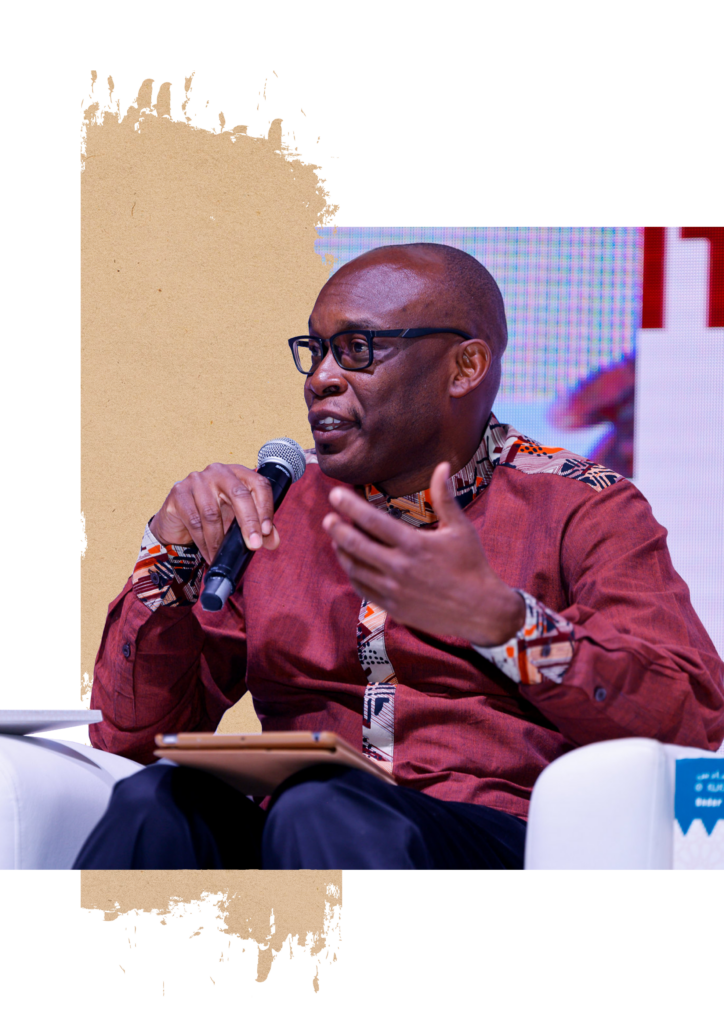
Priorities under this goal for the 2023–2028 strategy period
- Raise the bar on transparency, accountability, participation, and inclusion
All members are encouraged to tackle significant public policy challenges through OGP—and deepen their efforts on transparency, accountability, participation, and inclusion. While the first decade of OGP saw significant progress on transparency and open data efforts, a key lesson learned has been to go beyond transparency for transparency’s sake.
First, while the openness and flexibility to use the OGP platform to advance priorities relevant to country contexts remains, members will need to raise the bar on how they integrate open government approaches into thematic and sectoral policies and programs to deliver tangible outcomes. A refreshed Open Gov Guide will provide guidance and benchmarking to support progress.
Second, there will be a special focus on inclusive participation. Transformative public participation reforms have been too few and far between in the Partnership. Governments and civil society will need to make a collective push on weaving inclusive public participation into the fabric of institutions. The Support Unit will focus on enabling skill sharing and peer learning and on forging coalitions of officials and practitioners to implement public participation reforms, promote guidance and good practices, and support the work of national and local leaders to involve people in meaningful ways to shape the decisions that affect their lives.
Third, members can do more to make participatory initiatives more inclusive by working with gender groups, marginalized communities, youth, and other actors. The Support Unit will work with partners to build on the OGP Participation and Co-Creation Standards to promote and develop guidance and maturity models for inclusive participation.
- Launch a Partnership-wide challenge to promote collective action
To make more collective progress, a Partnership-wide challenge on a set of approximately ten open government areas will be defined and will be launched at the 2023 Global Summit in Estonia. All OGP members will be encouraged to advance on at least a few of these areas, which will be determined by the OGP Steering Committee, based on data related to ambition, growing areas of interest, and a mix of issues relevant to national and local contexts. For example, these issues could cover foundational open government areas, such as access to information and fiscal openness or access to public services.
The challenge areas can be pursued both within and outside the OGP action framework but will need to be anchored in OGP’s core principles of co-creation, action and implementation, and accountability and can take advantage of the Partnership’s collective resources and networks.
Reformers from government—spanning national and local executive, legislative, and judicial branches—will need to work with each other and civil society to secure political support for advancing progress on these challenge areas. The work of partners and alliances will continue to provide technical support and enable learning and sharing of resources in these areas. Together, reformers and partners will need to lead coalitions or networks to model ambition and action, and encourage others to do the same.
The Steering Committee and the Support Unit will forge links to global platforms such as Summit for Democracy, the G7 and G20, the UN Framework Convention on Climate Change, and others to raise collective ambition in the thematic areas. The Support Unit will also initiate leadership development activities, work on political engagement, and launch campaigns, where appropriate, in support of the Partnership-wide challenge.
An initial set of these challenge areas where the Support Unit will invest time and resources will include the priorities that surfaced prominently from the strategy consultations such as open government approaches to tackle corruption, develop and use digital technologies, advance action on climate change, and advancing legal empowerment and access to justice. This will be in addition to the cross-cutting focus on participation and inclusion.
- On tackling corruption, the overall focus will be on policies that tackle grand corruption and kleptocracy—illicit financial flows and money laundering—and on public integrity. This will include specific issues such as beneficial ownership, open contracting, lobbying, political finance, and asset disclosure, among others.
- On developing and using digital technologies, the overall focus will be on policies that target democratization and governance of digital tools, measures and tools to promote democracy, and data and digital transformation across other sectors of government.
- On advancing action on climate change, the overall focus will be on strengthening the transparency and accountability of domestic systems for managing climate finance, opening up climate-relevant data and information, and, importantly, encouraging uptake of innovations to deepen participation in climate-related policies.
- On promoting legal empowerment and access to justice, the overall focus will be on expanding mechanisms for access to justice for communities and opening up justice institutions as well as leveraging the justice sector to strengthen other open government measures.
The Support Unit will promote and support leadership that emerges from thematic coalitions and networks, and cultivate these coalitions in areas with gaps in leadership, to model action and inspire and support others. This will be complemented by cross-sector convening, campaigns, recognition, peer exchanges, implementation support, thematic grants, awards, and the use of global platforms to spur domestic action.
Strategic Goal 5
Become the home of inspirational open government innovations, evidence, and stories
Since the early days, OGP has invested in capturing and sharing examples from across the community as well as recognizing reformers and reforms. The OGP community has been proactive in sharing successes and failures, which has always been a critical part of OGP’s theory of change, both to inspire and grow the community and to encourage ambition on thematic priorities.
One of OGP’s core strengths is the volume of data, evidence, stories, and networks of experts that exist after eleven years of action plans, commitments, IRM reports, and research. There is huge potential to use this community-generated information in more strategic ways that empower reformers with what they need and to advance the other strategic goals.
This will be successful only if the content is sourced and shared from, by, and with the community. Doing so will require a combination of storytelling, qualitative research, and data. It will also need to balance the need for recognition and inspiration as well as evidence-based results. And it is about connecting both the content and the community.
How the OGP community can achieve this goal
The OGP community is the primary source of inspirational materials that, if better curated, will help deliver all of the goals in the Strategy. The effort to find and showcase stories, qualitative research, and data that combine inspiration with evidence-based results will continue to be a Partnership-wide priority.
In the future, the OGP Support Unit will invest much more in systematically and creatively unlocking these collective assets and making them easier to access in a diverse range of formats and products that are tailored to the needs of different audiences and help them in driving change. It will also continue to invest in strengthening and connecting the people, spaces, and networks at the heart of the Partnership.
Priorities under this goal for the 2023–2028 strategy period
The OGP Support Unit will work with others to produce dynamic resources with illustrative examples and approaches, supportive arguments, maturity models, references to existing third-party standards or ratings, and value propositions. This will include a refreshed Open Gov Guide, anchored in community content and co-created with expert organizations, to serve as a regularly updated single point of reference for what members can do to make progress on open government, based on their starting points. The aim will also be to make it much easier for reformers and partners to seek out and support each other.
The OGP Support Unit will develop a repository of high-quality, practical, and inspirational content and evidence with and for the wider community that meets their diverse needs, is easy to access, and will find its way back to the community in a wide range of formats and products. These resources will include communication materials, including OpenStories, curricula for capacity and leadership development, and knowledge resources.
To recognize and incentivize leaders, the OGP Support Unit will develop awards and recognition programs, complemented by other forms of support outlined in the Strategy.
Academic institutions and researcher-practitioner networks will have a key role in producing original research and continuing to build the evidence base for open government. Government and civil society will play an important part in incubating and sharing innovation and in generating lessons from such efforts. They are also encouraged to share learning, guidance, and advocacy resources from their contexts. The IRM will continue to have a vital role in producing and disseminating evidence-based research. The OGP Support Unit will focus on curating and distributing the work of these actors and combining it with evidence and actionable insights generated from OGP’s own data and learning initiatives.
Governance and Leadership
OGP’s governance bodies will be responsible for overseeing the implementation of the Strategy and providing political leadership.
The OGP Steering Committee is the initiative’s executive and strategic decision-making body. Reflecting the joint government–civil society nature of the Partnership, the Steering Committee is composed of government and civil society representatives in equal numbers. The Steering Committee plays a dual role in the organization: Like any governing body, it approves policies, programs, and procedures. However, it also plays a crucial role in very tangible ways to advance OGP’s impact. Steering Committee members are expected to set an example for other countries and use their diplomatic influence to encourage better participation in OGP by their peers. Learn more about the Steering Committee and its composition.
To complement the Steering Committee’s strategic oversight role, the Board of Directors is responsible for the fiduciary and legal oversight of OGP, which includes reviewing and approving OGP budgets. The Board draws its members from the Steering Committee, and both governance bodies keep each other informed of their activities. Learn more about the Board of Directors.
The International Experts Panel (IEP) is an advisory body made up of five regional and thematic experts. The IEP oversees the IRM to safeguard its independence and provides quality assurance over the IRM’s methodology, review process, conflicts of interest, and products. The IEP plays an important advisory role in setting the vision for the IRM and promoting its findings. IEP members are nominated through an open process and appointed by the OGP Steering Committee. Learn more about the International Experts Panel.
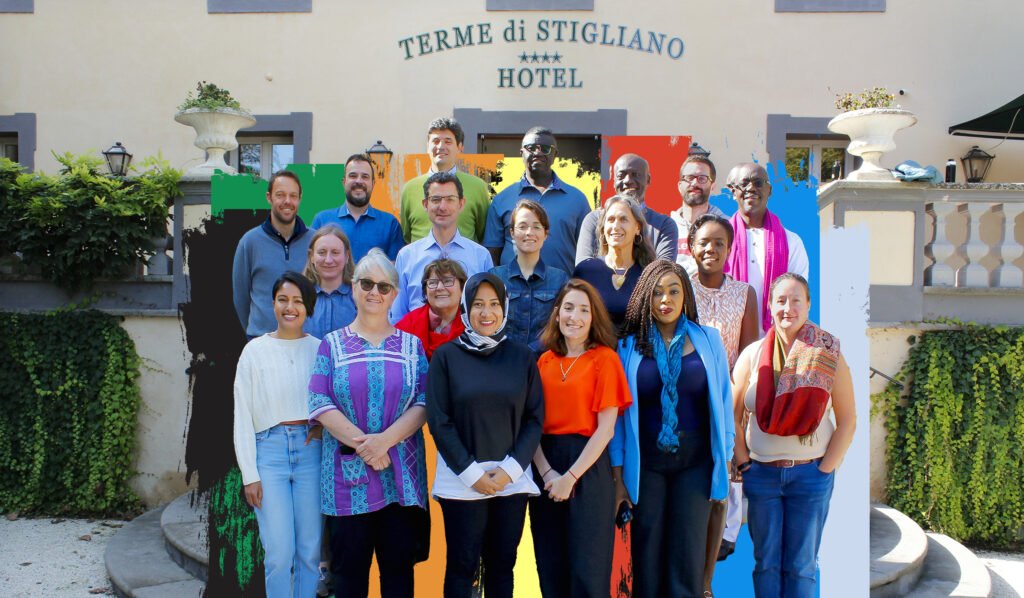
Governance Review
The launch of the Strategy is accompanied by a governance review that focuses on the role of the Steering Committee and will be completed in 2023. The main objective is to ensure that the Steering Committee’s mandate and ways of working and the overall OGP governance model remain fit for purpose to meet the needs of the moment and the new Strategy. Additionally, the review will assess how the Steering Committee relates to—and works with—other core OGP bodies, namely the Support Unit, the Board of Directors, and the IEP.
The review will encompass the following:
- Enhancing political leadership: This will involve reviewing the expectations and role of the Steering Committee to enable members to enhance their individual and collective responsibility in providing stronger political leadership and advocacy and in mobilizing resources for the Partnership. This will also include exploring ways to build a pipeline of future Steering Committee leadership.
- Creating space for new voices: The Steering Committee has always comprised diverse representation from all over the world, for both government and civil society. However, there remain voices and perspectives that are underrepresented, such as those of OGP Local members, youth advocates, sectors, or thematic networks. The governance review will examine how processes and structures can be strengthened to better reflect these and other important constituencies.
- Upgrading ways of working: This will focus on optimizing the ways of working in the Steering Committee and its subcommittees, as well as between the Steering Committee, the Support Unit, and the other governance bodies in OGP, to allow the Steering Committee to be strategically and externally focused as well as more efficient.
OGP’s Articles of Governance will be updated following this review to reflect any changes to OGP’s governance structures, the role of the Steering Committee, and any other governance implications resulting from the Strategy and the governance review.
Approach to Resource Mobilization
Resourcing for open government reforms and reformers is an essential precondition for the success of the Partnership and the implementation of this new Strategy. This includes resourcing both for civil society and government to drive changes and implement reforms, and for the OGP Support Unit and IRM to administer their core functions.
In recent years, the level of bilateral donor funding for governance work as part of government aid budgets has decreased due to external geopolitical factors, economic uncertainty, and domestic political pressures. Many foundation funders have also seen shifts in their strategies that have affected the overall level of funding directed to the open government field.
Amid this challenging context, OGP will look to redouble its efforts in engaging current and new funding sources, and adopting new approaches, to secure sustainable funding for the OGP Secretariat—the Support Unit and the IRM—and the open government field. These include:
- Collective fundraising: OGP will seek like-minded partners and donors, both global and domestic, in the priority thematic areas mentioned under strategic goal 4. Approaches will include reengaging with current donors in this space to build updated value propositions for open government and its alignment with their priority policy goals, OGP-led or coalition-based approaches to engaging current and new donors in these thematic policy areas, and joint proposals—competitive or noncompetitive—with partners. It will also entail seeking new partnerships with bilateral, multilateral, and foundation funders on new innovations in OGP’s work which align with their strategies, including the trend towards localization.
- Support for local actors in open government ecosystems: In recent years, there has been greater interest in the funder landscape to invest in local communities and organizations, which has presented an opportunity to support local coalitions and partners that work on reforms through open government approaches. Supporting local reformers is a core part of OGP’s DNA, and bilateral and foundation funders can take advantage of OGP’s unique positioning and network to create more funding opportunities for local actors. Support for local actors in open government ecosystems: In recent years, there has been greater interest in the funder landscape to invest in local communities and organizations, which has presented an opportunity to support local coalitions and partners that work on reforms through open government approaches. Supporting local reformers is a core part of OGP’s DNA, and bilateral and foundation funders can take advantage of OGP’s unique positioning and network to create more funding opportunities for local actors.
Strategies for achieving this will include the OGP Support Unit seeking connections with funders to identify target countries, which may be those that have political windows of opportunity, have high funding needs, or align with donor priority countries or regions. Among bilateral donors, this could include closer OGP coordination with country or regional missions, where there may be funding opportunities for domestic or regional funding. It will also include seeking out opportunities to create funding pools for civil society in specific regions or countries or subnational jurisdictions to tap into as needs arise.
Finally, it will include exploring more regionally focused programs—such as the EU for Integrity Program for the Eastern Partnership, funded by the European Commission, or the PAGOF II program, funded by the Agence française de Développement for Francophone African countries—that create resources both for local civil society and government and for the OGP Support Unit and IRM.
- Country contributions: OGP has requested contributions from all member countries on a voluntary basis since 2015, reflecting members’ ownership in the Partnership. These member contributions are a vital source of funding that helps the OGP Secretariat to provide essential services to all member governments and civil society.
Country contributions will be increased over a two-year period starting in 2024. The increase reflects rising inflation worldwide and the need to provide sustainable funding for the implementation of OGP’s 2023–2028 Strategy. The OGP Support Unit and Steering Committee will also prioritize outreach to, and provide support for, current non-paying members to start making contributions.
These country contributions enable the OGP Secretariat to provide essential services to all member governments and civil society, including supporting the co-creation and implementation of domestic reforms, convening regional and global peer learning opportunities, providing technical expertise on thematic policy areas, offering training on leadership and coalition building, and organizing regional and global events to bring the open government community together. In addition, the IRM tracks progress in participating countries through independent, evidence-based, and objective reporting to hold OGP members accountable and support their open government efforts.
Implementation Approach
Achieving the strategic goals outlined in the OGP 2023–2028 Strategy will need changes in approaches, ways of working, and learning across all parts of the Partnership. Not all of these changes can realistically commence at the same time given the scope and ambition of the Strategy. Implementation will be sequenced: foundational activities, such as rethinking OGP’s action framework and defining thematic challenge areas, will be prioritized in the early years to enable some of the more advanced goals, such as building more public support for the open government agenda, to be pursued in subsequent years.
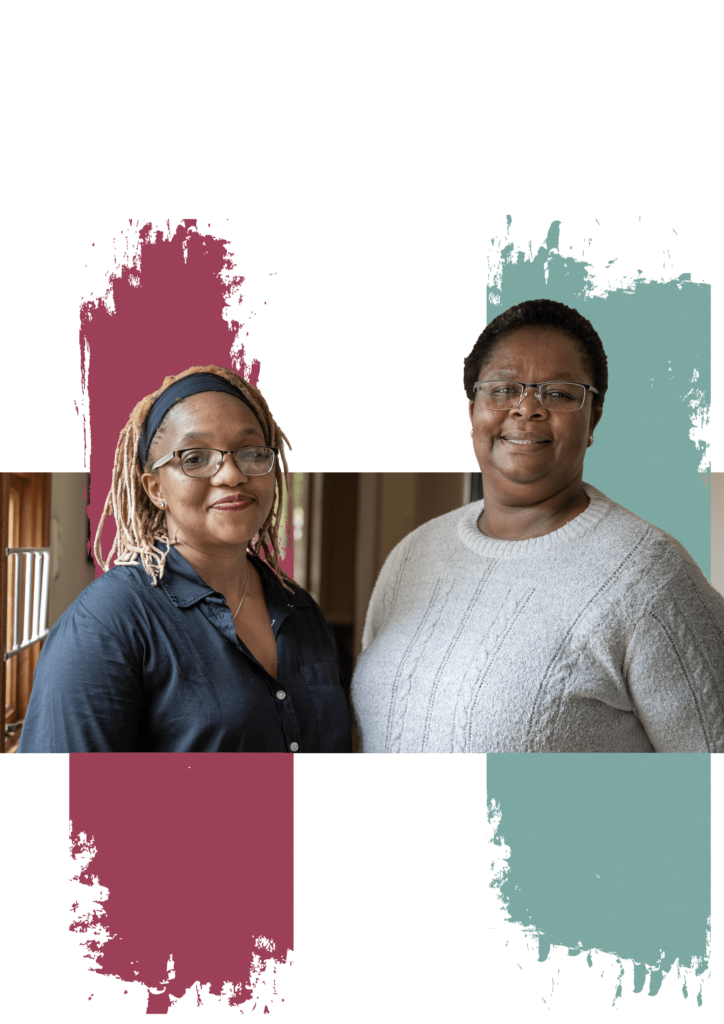 Implementation of the Partnership-wide Strategy will require coordination among the many actors that make up Partnership.
Implementation of the Partnership-wide Strategy will require coordination among the many actors that make up Partnership.
The OGP Steering Committee will provide strategic direction to the implementation of the Strategy and approve OGP Support Unit and IRM work plans to advance the strategic goals. The OGP Support Unit and IRM will report annually on the work plans. Annual reports will be published, with a public comment period to ensure that the reports can reflect the progress of the broader Partnership.
Budgets to support implementation of the Strategy will be approved by the OGP Board of Directors.
OGP global summits and regional events, and biennial stakeholder surveys will be used as opportunities to engage with the wider OGP community and partners to help advance implementation, to take regular stock of progress and solicit input for the Support Unit and Steering Committee’s biennial work plans.
In addition, OGP SU will use IRM data and analysis and the learning framework that will be developed in the first year of the strategy to inform periodic tracking and sense-making of the progress made in advancing the Strategy.
Learning Approach
In the first year of strategy implementation, the OGP Support Unit will refresh its learning approach to be aligned with the Strategy. The Strategy supports individual and systemic change through both tangible measures—those that can be easily shown or measured—and intangible ones—those that can influence or contribute but are harder to show or measure directly. In the case of individual leaders and reformers, intangible measures may relate to their capabilities, political opportunities, and influence, while tangible measures relate to the resources available to them to drive change. Systemic change would look at intangible aspects such as trust and relationships between governments and nongovernmental actors, collective action, and global norm building as well as tangible and formal changes in policies and laws or the establishment of new coalitions.
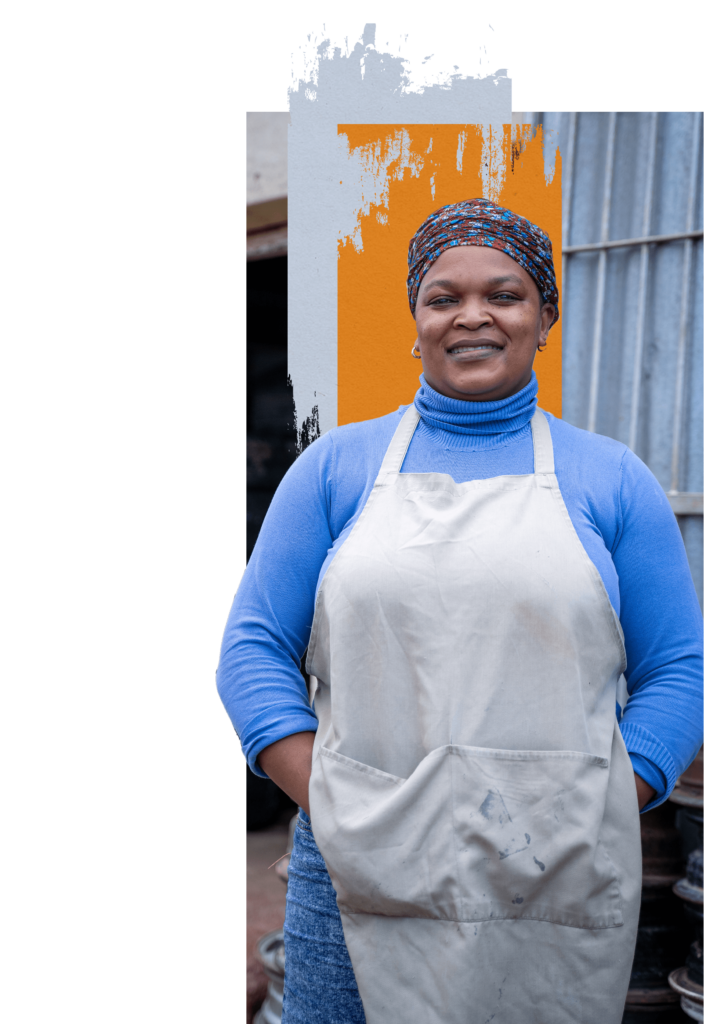 The learning approach will be designed with measurement methods that can track both the systemic and individual, and tangible and intangible change to help test assumptions made in the theory of change and action, assess progress on strategy implementation and inform course correction, if needed.
The learning approach will be designed with measurement methods that can track both the systemic and individual, and tangible and intangible change to help test assumptions made in the theory of change and action, assess progress on strategy implementation and inform course correction, if needed.
Illustrative examples of the new types of questions that could underpin an updated learning framework include:
- Where and how are the open government leadership and skill-building capabilities and connections that we offer helping strengthen individual reformers? How does this shape the progress of the reforms they are driving?
- Which sets of incentives provided by the new action framework are working to drive greater ambition in open government reforms?
- What enables the mainstreaming of open government beyond OGP action plans?
- Are new actors in government more openly discussing and engaging with sensitive subjects like civic space? Are civil society leaders negotiating it differently?
- Where and how are benchmarking, challenges, and other tools incentivizing ambition in selected thematic priority areas
- What are effective ways in which the Partnership can be challenged and supported to achieve collective progress?
- How is the Partnership using and benefiting from the resources developed and curated by OGP?
Answering these questions will require a combination of approaches, including sense making and collaboration with the community, strategy reviews, using a mix of qualitative and quantitative methods that can track different types of changes and connect them over time, using IRM data and analytics in conjunction with methods like outcome harvesting and contributions analysis. The Support Unit will lead periodic strategy reviews with the community in the spirit of real-time learning and adjustment. A formal evaluation of the strategy, overseen by the OGP Steering Committee, will be commissioned at the end of the Strategy period.


